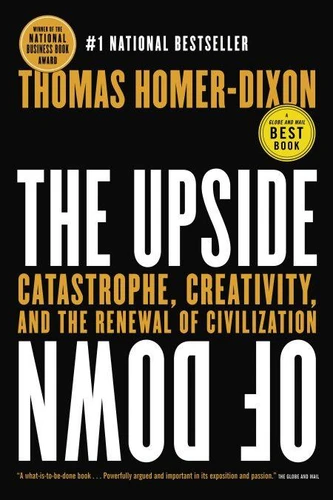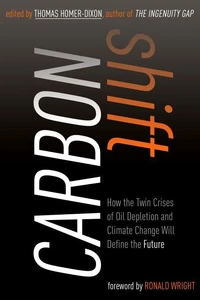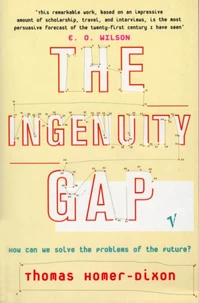The Upside of Down. Catastrophe, Creativity and the Renewal of Civilization
Par :Formats :
Disponible dans votre compte client Decitre ou Furet du Nord dès validation de votre commande. Le format ePub protégé est :
- Compatible avec une lecture sur My Vivlio (smartphone, tablette, ordinateur)
- Compatible avec une lecture sur liseuses Vivlio
- Pour les liseuses autres que Vivlio, vous devez utiliser le logiciel Adobe Digital Edition. Non compatible avec la lecture sur les liseuses Kindle, Remarkable et Sony
- Non compatible avec un achat hors France métropolitaine
 , qui est-ce ?
, qui est-ce ?Notre partenaire de plateforme de lecture numérique où vous retrouverez l'ensemble de vos ebooks gratuitement
Pour en savoir plus sur nos ebooks, consultez notre aide en ligne ici
- Nombre de pages256
- FormatePub
- ISBN978-0-307-37587-2
- EAN9780307375872
- Date de parution05/02/2010
- Protection num.Adobe DRM
- Taille5 Mo
- Infos supplémentairesepub
- ÉditeurVintage Canada
Résumé
From the author of the #1 bestselling and Governor General's Literary Award-winning The Ingenuity Gap - an essential addition to the bookshelf of every thinking person with a stake in our world and our civilization. This is a groundbreaking, essential book for our times. Thomas Homer-Dixon brings to bear his formidable understanding of the urgent problems that confront our world to clarify their scope and deep causes.
The Upside of Down provides a vivid picture of the immense stresses that are simultaneously converging on our societies and threatening a breakdown that would profoundly shake civilization. It shows, too, how we can choose a better route into the future. With the immediacy that characterized his award-winning international bestseller, The Ingenuity Gap, Homer-Dixon takes us on a remarkable journey - from the fall of the Roman empire to the devastation of the 9/11 attacks in New York, from Toronto in the 2003 blackout to the ancient temples of Lebanon and the wildfires of California.
Incorporating the newest findings from an astonishing array of disciplines, he argues that the great stresses our world is experiencing - global warming, energy scarcity, population imbalances, and widening gaps between rich and poor - can't be looked at independently. As these stresses combine and converge, the risk of breakdown rises. The first signs are appearing in the wastelands of the Arctic, the mud-clogged streets of Gonaïves, Haiti, and the volatile regions of the Middle East and Asia.
But while the consequences of denial in our more perilous world are dire, Homer-Dixon makes clear that we can use our emerging understanding of the complex systems in which we live to avoid catastrophic collapse in a way the Roman empire could not. This vitally important new book shows how, in the face of breakdown, we can still provide for the renewal of our global civilization. We are creating the conditions for catastrophe, but by understanding the underlying principles that make human and natural systems resilient - and by working together to put those principles into effect - we can still limit the severity of collapse and foster regeneration, innovation, and renewal.
The Upside of Down provides a vivid picture of the immense stresses that are simultaneously converging on our societies and threatening a breakdown that would profoundly shake civilization. It shows, too, how we can choose a better route into the future. With the immediacy that characterized his award-winning international bestseller, The Ingenuity Gap, Homer-Dixon takes us on a remarkable journey - from the fall of the Roman empire to the devastation of the 9/11 attacks in New York, from Toronto in the 2003 blackout to the ancient temples of Lebanon and the wildfires of California.
Incorporating the newest findings from an astonishing array of disciplines, he argues that the great stresses our world is experiencing - global warming, energy scarcity, population imbalances, and widening gaps between rich and poor - can't be looked at independently. As these stresses combine and converge, the risk of breakdown rises. The first signs are appearing in the wastelands of the Arctic, the mud-clogged streets of Gonaïves, Haiti, and the volatile regions of the Middle East and Asia.
But while the consequences of denial in our more perilous world are dire, Homer-Dixon makes clear that we can use our emerging understanding of the complex systems in which we live to avoid catastrophic collapse in a way the Roman empire could not. This vitally important new book shows how, in the face of breakdown, we can still provide for the renewal of our global civilization. We are creating the conditions for catastrophe, but by understanding the underlying principles that make human and natural systems resilient - and by working together to put those principles into effect - we can still limit the severity of collapse and foster regeneration, innovation, and renewal.
From the author of the #1 bestselling and Governor General's Literary Award-winning The Ingenuity Gap - an essential addition to the bookshelf of every thinking person with a stake in our world and our civilization. This is a groundbreaking, essential book for our times. Thomas Homer-Dixon brings to bear his formidable understanding of the urgent problems that confront our world to clarify their scope and deep causes.
The Upside of Down provides a vivid picture of the immense stresses that are simultaneously converging on our societies and threatening a breakdown that would profoundly shake civilization. It shows, too, how we can choose a better route into the future. With the immediacy that characterized his award-winning international bestseller, The Ingenuity Gap, Homer-Dixon takes us on a remarkable journey - from the fall of the Roman empire to the devastation of the 9/11 attacks in New York, from Toronto in the 2003 blackout to the ancient temples of Lebanon and the wildfires of California.
Incorporating the newest findings from an astonishing array of disciplines, he argues that the great stresses our world is experiencing - global warming, energy scarcity, population imbalances, and widening gaps between rich and poor - can't be looked at independently. As these stresses combine and converge, the risk of breakdown rises. The first signs are appearing in the wastelands of the Arctic, the mud-clogged streets of Gonaïves, Haiti, and the volatile regions of the Middle East and Asia.
But while the consequences of denial in our more perilous world are dire, Homer-Dixon makes clear that we can use our emerging understanding of the complex systems in which we live to avoid catastrophic collapse in a way the Roman empire could not. This vitally important new book shows how, in the face of breakdown, we can still provide for the renewal of our global civilization. We are creating the conditions for catastrophe, but by understanding the underlying principles that make human and natural systems resilient - and by working together to put those principles into effect - we can still limit the severity of collapse and foster regeneration, innovation, and renewal.
The Upside of Down provides a vivid picture of the immense stresses that are simultaneously converging on our societies and threatening a breakdown that would profoundly shake civilization. It shows, too, how we can choose a better route into the future. With the immediacy that characterized his award-winning international bestseller, The Ingenuity Gap, Homer-Dixon takes us on a remarkable journey - from the fall of the Roman empire to the devastation of the 9/11 attacks in New York, from Toronto in the 2003 blackout to the ancient temples of Lebanon and the wildfires of California.
Incorporating the newest findings from an astonishing array of disciplines, he argues that the great stresses our world is experiencing - global warming, energy scarcity, population imbalances, and widening gaps between rich and poor - can't be looked at independently. As these stresses combine and converge, the risk of breakdown rises. The first signs are appearing in the wastelands of the Arctic, the mud-clogged streets of Gonaïves, Haiti, and the volatile regions of the Middle East and Asia.
But while the consequences of denial in our more perilous world are dire, Homer-Dixon makes clear that we can use our emerging understanding of the complex systems in which we live to avoid catastrophic collapse in a way the Roman empire could not. This vitally important new book shows how, in the face of breakdown, we can still provide for the renewal of our global civilization. We are creating the conditions for catastrophe, but by understanding the underlying principles that make human and natural systems resilient - and by working together to put those principles into effect - we can still limit the severity of collapse and foster regeneration, innovation, and renewal.





